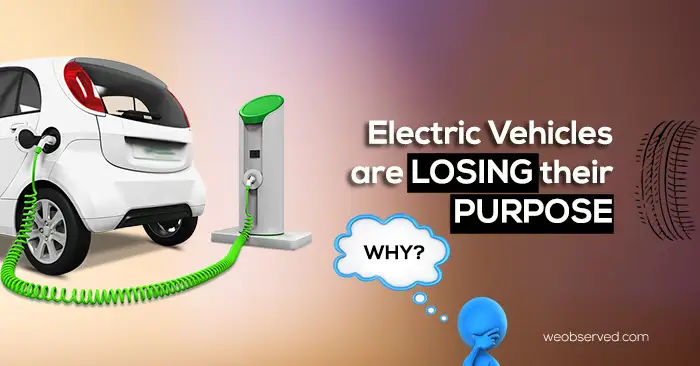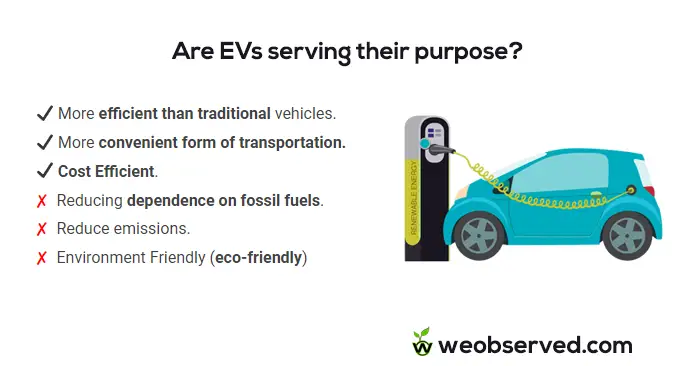I write a few blog posts from time to time at We Observed which are neither about products nor about ranking. it’s just to share my thoughts and opinion about something important to my mature readers. Last time the topic was the disadvantages of e-learning and online classes and this time the topic is electric vehicles and their purpose. I will here explain why I titled this article “Electric vehicles are losing their purpose” and after reading this you may also agree with my thoughts or not. However, this blog post represents my views only and I am not targeting any one company or technology with it.
After reading an indirect disclaimer let’s move to the main topic: Electric Vehicles are losing their purpose, and to understand the context you need to first understand the whole purpose of the Electric Vehicle revolution.
The purpose of the Electric Vehicle revolution
The history of electric vehicles is much older than Tesla and other electric vehicle companies or manufacturers you might think of. If you want to know the history of Electric vehicles you can read: History of Electric Vehicles : From Where it All Started?
The EV revolution is a movement to switch from traditional fuel-based vehicles to electric vehicles (EVs). Its purpose is to reduce the environmental impacts of transportation by reducing the amount of greenhouse gas emissions from cars and trucks. EVs are also more efficient than traditional vehicles, meaning they cost less to run and require fewer resources to produce. Additionally, EVs can provide an economical, convenient and eco-friendly form of transportation for people who don’t have access to traditional vehicles.
In short, the initial objective of the EV revolution was to reduce air pollution and dependence on fossil fuels, while also providing a more efficient, eco-friendly and cost-effective form of transportation while improving public health.
Must Read:8 Simple Ways to Break the Plastic Habit
Are EVs serving their purpose?
The current state of the electric vehicle industry suggests that this technology has ticked most of the boxes but there are a few where it has failed.
✔ More efficient than traditional vehicles.
✔ Moreconvenient form of transportation.
✔ Cost Efficient.
✘ Reducing dependence on fossil fuels.
✘ Reduce emissions.
✘ Environment Friendly (eco-friendly)
So where is it failing? let’s find out the major reasons.

People all over the world are eager to adopt electric vehicles and why not? It is a pocket-friendly, safe and more efficient mode of transport. However, since it is still not a fully developed technology and is dependent on other industries, there are some problems that need attention.
According to ICF, the same level of EV adoption could reduce emissions by up to 82% if those EVs were charged from an electric grid powered primarily by clean energy. A decarbonized power sector is required to get the transportation sector closer to net zero. The EV revolution leads to green, emission and sound-free transport reducing pollution levels in our cities.
So the first and very well-known reason here is the Lack of Proper eco-friendly Charging Infrastructure.Let’s talk about it in detail.
Must Read: 10 Best Digital Tyre Inflators in India for Your Vehicle
Lack of Proper eco-friendly Charging Infrastructure
Electric vehicles have become increasingly popular in recent years due to their potential to reduce emissions and improve air quality. However, electric vehicleshave a limited range before they must be recharged and charging an electric vehicle takes much longer than filling up a tank of gas, making long trips difficult. However, the problem here is that the charging infrastructure (first) is still not widespread enough to make long trips feasible, and second, still not fully eco-friendly due to the lack of proper eco-friendly charging infrastructure, most of the charging stations still work on fossil fuel.
According to the Union of Concerned Scientists, “Though electric vehicles produce no tailpipe emissions, they are responsible for the emissions associated with electricity production. On average, about two-thirds of the electricity in the United States comes from burning fossil fuels like coal and natural gas… In regions with high levels of electricity from fossil fuels, electric vehicles can be responsible for a higher carbon footprint than a gasoline-powered vehicle.”
Currently, most electric vehicles rely on energy from grid electricity, which is often generated from burning fossil fuels such as coal. This means that electric vehicles are not as “green” as they are often portrayed. In addition, the process of charging electric vehicles can be inefficient. For example, some charging stations use more power than the vehicles they are charging, and many charge batteries inefficiently. This leads to wasted energy, which is not eco–friendly.
And the second and not-so-well-known reason is:
Energy consumptionin mining lithium–ion and extracting cobalt.
Electric vehicle technology is not fully eco–friendly due to the high energy consumption associated with mining lithium–ion and extracting cobalt.
According to a report by the European Commission, the energy demand for mining, processing, and manufacturing of cobalt is estimated to be about 14 GWh per ton of metal—equivalent to approximately 5,000 barrels of oil. The mining process for lithium-ion batteries produces high levels of carbon dioxide, sulfur dioxide, and nitrogen oxides, further contributing to air pollution.
Additionally, the process of extracting lithium from brine is known to be energy-intensive and has been associated with water scarcity in areas with limited access to water. This is due to the fact that the majority of cobalt and lithium are currently sourced from developing countries, often with limited access to renewable energy sources.
Also Read: 10 Best Microwave ovens in India 2023 : Buy Now!
These countries are heavily reliant on (again) fossil fuels for energy production, which often results in high carbon emissions. The high emissions associated with cobalt and lithium extraction further contribute to climate change and environmental degradation.
High carbon emissions
Above two points highlighted that “EV batteries produce high carbon emissions through their production and the electricity used to charge them”. However, it has been also noted that the complete process of manufacturing an EV still requires different types of materials and electricity at various levels. When combined together electric vehicles including their batteries produce high carbon emissions.
Just for an example, a Tesla Model S Plaid with a 212 kWh battery can emit up to 17 Metric Tons of Carbon, which is three times more than a car with an ICE engine.
The trend of High Power Engines
Electric vehicles (EVs) have taken the world by storm in the last few years, with the introduction of the Tesla Model S Plaid and Rivian R1T. This is due to the US car culture, which favours bigger cars and engines. Taxes on cars are lower than in other countries, making it easier and more affordable for people to buy cars.
However, these powerful EVs are not very eco-friendly for the reasons mentioned above. Despite all the environmental drawbacks, American car manufacturers continue to build cars with bigger engines and more power. It is true that sometimes these cars are necessary for work, but more often they are bought for fun and to show off.
You may also Like: 38 Best Eco-Friendly Business Ideas for a Sustainable Future
American car manufacturers established a standard, and to remain in competition, other companies are forced to launch bigger, better, and more powerful EVs. The trend of overpowered EVs is growing in the US and other countries, even if they are not required. And as we all know very well that more power is equal to more emissions, which makes these EVs no better than ICE engines.
The road ahead (Solution), as we all know

Electric Vehicles are losing their purpose and the major reasons are explained above. But what about the solution?
All EV manufacturers know about these problems and they are also trying to cater for these solutions. However, we also need to understand that these problems will take time to be resolved. So, what for now?
First of all,
As a buyer, make Wise Decisions
We need to understand the American automotive culture and what drives it. Americans have traditionally preferred larger automobiles and engines. The United States has a big land area but a small population. As a result, individuals use larger vehicles to go greater distances.
Furthermore, car taxes in the United States are substantially lower than in other nations, making it easier and more economical for people to own cars. This preference has also been transferred to EVs. We as a buyer need not follow in their footsteps, choose your electric vehicle wisely.
Also Check:Different Types of Motorcycle Bags and Their Uses
Make sure to analyze your requirement first and then filter the list of available EVs. This will help you make better use of this technology without burning a hole in your pocket and without causing much harm to our environment.
As an EV maker, make EVs more efficient and sustainable.
It’s important to remember that the power of an EV doesn’t necessarily make it eco-friendly. Cars with smaller engines and batteries can be just as fast and efficient, using far less energy and doing less harm to the environment. So, if you as an EV maker really care about the environment, instead of focusing on bigger engines, you should try to make your cars more efficient and durable.
Additionally, to make electric vehicle technology more eco–friendly, there needs to be a shift towards renewable energy sources for charging.
According to the International Energy Agency, “The growth of electric vehicles requires a shift to renewable energy sources for charging and the development of smart charging systems.” This includes the development of more efficient charging systems, as well as the establishment of charging infrastructure powered by renewable energy sources such as wind and solar.
More efficient Charging and Mining Infrastructure
Since EV makers are not the only player here, I kept this point separate.
As the demand for electric vehicles continues to increase, so too does the need for cobalt and lithium to power them. To ensure the future of electric vehicles is truly eco–friendly, the focus must be on transitioning away from fossil fuels and towards renewable energy sources in the production and extraction of cobalt and lithium.
As noted by the International Energy Agency, “decarbonizing the energy used in the production of key EV components, such as lithium-ion batteries, is key to achieving large-scale EV deployment in a climate-friendly way.”
Also Read: 34 Simple Hackathon Ideas to Upgrade Living
Conclusion: Electric Vehicles are losing their purpose? Your Views
EVs are built to avoid fossil fuels, but ironically, they are using those same fossil fuels but in diffrent way.
Electric Vehicles are losing their purpose, this technology is not entirely eco-friendly due to a lack of proper eco-friendly charging infrastructure, mining process and manufacturing process. Making electric vehicle technology more environmentally friendly requires a shift towards renewable energy sources for charging, mining and manufacturing; government help in taxes; and the use of better materials. This will take time but once it is done, electric vehicles will be able to truly serve their purpose.
As I said above, this article represents my views, you could be different. If you want to say something on this topic comment section is all yours. Feel free to share your views. I will meet you with another topic very soon, till then, cheers and ciao!
Source: International Energy Agency, European Commission, ICF, ToolQi, EV Observed | Photo by Juan Pablo Serrano Arenas,







Yes, Totally agree that the EV industry and technology are not fully ready yet. they still need time to short out a few things. And those few things are vital. They have speed, and power for now but are actually losing their main purpose.